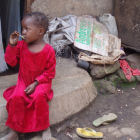Journalists are eligible for free email subscriptions to SEJournal, including TipSheet, WatchDog (on access issues) and more.

The scientific jury on whether climate change will cause a rise in insect-borne disease is still out. Will warmer temperatures worsen the burden of insect-borne diseases such as malaria and dengue fever?
SciDev.Net (The Science and Development Network) published on September 10, 2009, a spotlight on the impact of climate change on the spread of insect-borne disease that considers how countries can prepare for these changes.
This spotlight offers a genuine international perspective to the debate, with a series of articles and commentaries written by experts including Jai Narain, director of the Communicable Diseases Department at the WHO Regional Office, India, Paul Reiter, professor of medical entomology, Institut Pasteur, France, and Ulisses Confalonieri, professor of public health, Oswaldo Cruz Foundation (FIOCRUZ), Brazil.
The spotlight provides a series of articles and commentaries written by international experts that:
- explains the links between climate and insect-borne disease;
- examines the evidence for and against the idea that climate change will spur a rise in these diseases;
- asks how developing countries can prepare for any changes; and
- provides advice to policymakers already struggling to control these diseases on the ground.










 Advertisement
Advertisement 


